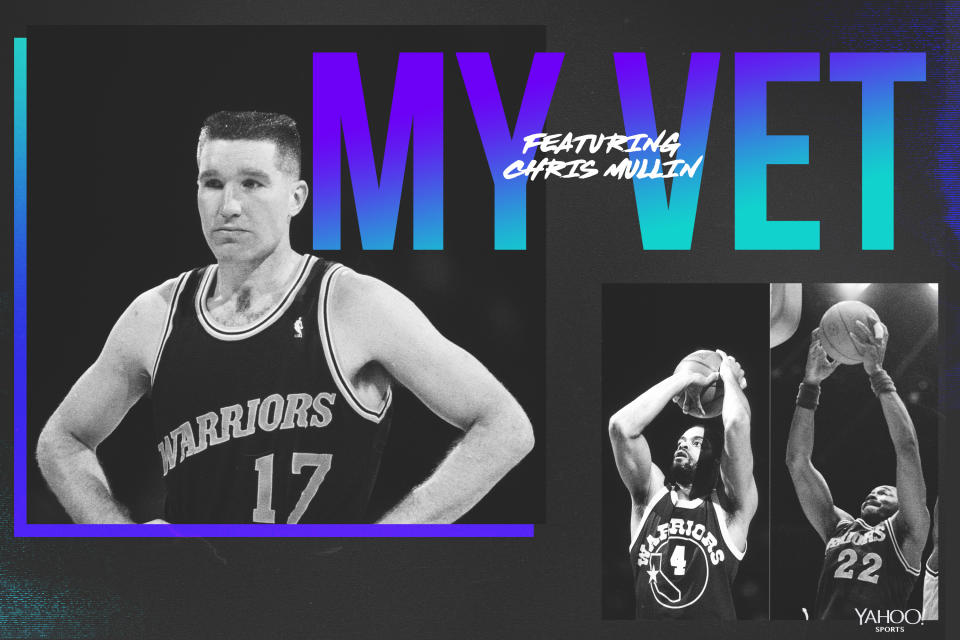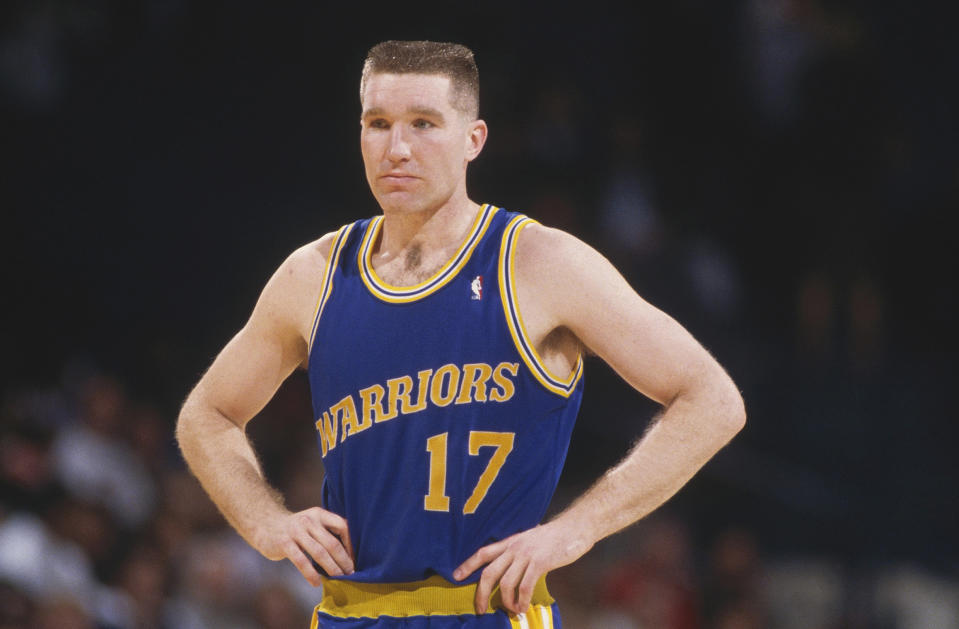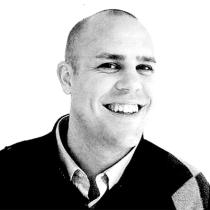My Vet: Chris Mullin on mentorship, the Run TMC Warriors and why rookie duties are B.S.

“Everyone has a vet.” That statement from Kevin Garnett has stuck with me. Sam Mitchell was his. He was Rajon Rondo’s. It’s the circle of NBA life. You would be hard-pressed to find a player whose career was not set on its course by a veteran in his first locker room. Those who become vets themselves pass those lessons along. These are their stories.
[Previously on My Vet: Isiah Thomas • Vince Carter]
Chris Mullin played 16 NBA seasons — the first 12 with the Golden State Warriors and three with the Indiana Pacers before returning to Oakland. He made five straight All-Star teams from 1988-93, shared a First Team All-NBA backcourt with Michael Jordan and then served alongside more legends with the Dream Team. Still working with USA Basketball, Mullin took time away from his ambassadorship for the 3-on-3 competition at the 2020 Olympic Games to talk to Yahoo Sports.
Who is your vet, and how did that relationship develop?
Mullin: Two players stick out. Initially, Greg Ballard, who was a veteran when I went to the Warriors. We lived near each other. He played on the Washington Bullets at the time, a championship team. He was a guy who took me under his wing.
Probably more prominently, a few years into my career, Rod Higgins was a guy who I became very close to. We played the same position at one point and battled for minutes, and Rod became a mentor to me. He was a veteran presence, slash, one of our best friends and brought us all together. Rod had a huge impact, especially as my career progressed.
What on- and off-court lessons did you learn from them?
Mullin: I think, first and foremost, daily habits — having a good routine, training, rest and having the proper balance in those routines. At one point, Rod and I were competing for minutes, but as I progressed, he just gracefully used it as a motivating factor to bring us together. There’s always that dynamic within the team where you have a healthy competition. You want to compete, but you want to make your teammates better. That’s a fine balance, too.
When you get into the professional ranks after college, where all your time is pretty much accounted for — class and all that — in the NBA you have a lot of free time, and what you do with that time really dictates your success. Your daily habits, your routine that you develop with your free time.
Back then, believe it or not, we would fly commercial. There was another whole dynamic there being exposed to the public while you’re working. So, just conducting yourself walking through an airport, interacting with fans. That alone kept us grounded. How we conducted ourselves after a tough loss, cruising through an airport at 6 a.m., being courteous and polite at that point in time.
Tell me about the legendary Dream Team practice shootout with Larry Bird.
Mullin: The way it came about, Chuck Daly famously didn’t call a timeout the whole Olympics. Once we got to Barcelona, we didn’t practice, either. There was a lot of free time, so that day myself, Larry and David Robinson went over to where we had gym time, just to get out of the hotel, because we were playing late in the evening.
Larry and I were just playing a shooting game. He probably wasn’t thinking much of it. I was like, “Man, I’ve got a chance to beat Larry Bird. I gotta get this guy.” I went up. I was up big, really big, but we just kept shooting. David was lifting weights, so we kept shooting, and somehow he got even and stopped the game. He said, “I never lost a shooting game, I never will.” I should’ve known. Larry was a pretty shrewd character. I was up like 10 or 12 shots, but he got it even and shut it down.
Then, when we got back from the Olympics, he retired like 10 days later. And when I played for him with the Pacers, I always tried to get him back out there, but he resisted: “Nope, I’m good.”

What were your rookie duties?
Mullin: My rookie year, back then, when you were drafted, you were actually a free agent before the rookie scale. I was one of those rebels who held out, didn’t go to training camp and showed up six games into the season. I got off on the wrong foot to begin with. But, yeah, [I was] getting newspapers or whatever that might be.
I’ll say this: When we drafted Mitch Richmond, I was totally the opposite. I was like, “I’m not doing that.” I thought it was bulls---. It was a waste of time and taught you nothing. I was talking about Rod: Bring the team together. I can get my own coffee. You don’t have to get my laundry. In turn, we didn’t do it to Tim [Hardaway]. And 35 years later, we’re still friends. That might have something to do with it. It was the dumbest thing in the world. Help me with my jump shot, don’t get my coffee.
What was your ‘Welcome to the NBA’ moment?
Mullin: My career trajectory was a jagged edge somewhat. I sat out the first six games. My first game, I showed up in Oakland, signed my contract, played that night and made the game-winning bucket. Things went down from there for a few years, and then I got myself together and went on a real long streak.
Larry Bird was one of my idols. Magic Johnson. So, playing against those guys was a great experience, eye-opening and intimidating, but much like anything else, when you get to a new job, a new career, it’s really about succeeding each and every day and gaining confidence in yourself. People can tell you’re good, you can get drafted high, but until you get out there and do it yourself, that’s the ultimate way to gain your confidence and know you belong.
What was your ‘I’m here to stay’ moment?
Mullin: I went to rehab in December 1987 through January 1988, came out, and I think played the last 20-25 games. I felt good about my game and was still kind of figuring it out. That summer, I trained extensively and dedicated myself to fitness and skill work. The following year, I went back and had an All-Star season. So, probably 1989, I went back, had a really good year and took off.
Are there guys who you formed a bond with once you became a veteran?
Mullin: I wound up staying with the Warriors for 12 years, and a lot of players moved around, but I was one guy who stayed. Mitch and Tim came in, and I became very close to them. Across the years, Chris Webber came in, Latrell Sprewell. It wasn’t anything planned, but if they joined in during the offseason, it was just passing on routines and practice habits and things the college kids didn’t do. With all that free time, you’re mapping out your daily routine on how to prepare in season, game day, off day and then offseason. Whole different approaches.
Given your experience as a coach at St. John’s and with USA Basketball now, how important is it for you to pass along this idea of mentorship in the game?
Mullin: It’s very important. Tradition and history is the roadmap. You have to understand where you’ve been to understand where you’re going. So, all across the board, it’s all about passing along knowledge, wisdom and information to the next group of players. I think our players now with the access to information are very well-versed on the history and tradition and handle themselves with respect to the past. I think they’ve also learned a lot of good lessons to imitate the winners and stay away from some of the mistakes that were made. They can learn from both.
If you are an active or former NBA player who would like to share your My Vet story, contact Yahoo Sports writer Ben Rohrbach via email, Twitter, Instagram or Facebook.
– – – – – – –
Ben Rohrbach is a staff writer for Yahoo Sports. Have a tip? Email him at rohrbach_ben@yahoo.com or follow him on Twitter! Follow @brohrbach
More from Yahoo Sports:


